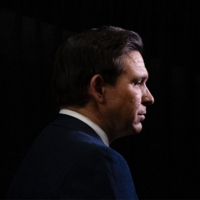Mentions
- Post
‘“God must love the common people,” said Abraham Lincoln. “He did make so many of them.” If this country finds the will to pull itself back from the brink, it will come from the nation’s heart; not a formula, or a technique, or even a particular ideological program but a felt need, an inextricable determination, a sense of necessity—not just that things can change, but that they must. Trump embodied that imperative in a way that DeSantis—or anyone else for that matter—could not. In a number of important ways, my time on his rival’s campaign deepened my appreciation for what the former and perhaps future president represents. I don’t resent Republican voters for being a step ahead of me on the curve.”

- Post
“Those of us in the political class often recognize no distinction between these two forms of politics or, when we do, we discount the latter as just the irrational, anti-intellectual impulses of the common voter. The idea of Trumpism as a “cult of personality” rather than a substantive policy agenda has become a popular cliché for this reason. But this is a feature, not a bug, of self-government. In a time such as ours, when our ruling class has so ensconced itself in ideological fads and theories as to have completely severed itself from the laws of reality, the instincts, feelings, and intuitions of the people—the politics of the heart—offer a welcome corrective to an elite that is enchanted with the search for utopia.”

- Post
“Donald Trump has a practical mastery of conservatism—if not the intellectual, ideologized conservatism that one encounters inside the Beltway, then certainly the felt conservatism of the heart that is native to the GOP base. It is a conservatism that is intimated rather than reasoned. DeSantis, on the other hand, justified his political project in terms of a formal ideology. This endeared him to the conservative political and intellectual elite who reside in the world of ideology, but it stunted his ability to speak to the millions of Americans who instinctively “got” Trump and neither needed nor desired a more complex ideological framework for their political attachments.”

- Post
“While the campaign’s issue set, record, and candidate all looked pristine on paper, the effort to convert them into a winning presidential run overlooked how normal people think. DeSantis was selling a plan; Trump was selling a feeling. That doesn’t make Trump’s pitch less legitimate. Loyalty, solidarity, mutual obligation, and a willingness to sacrifice are the lifeblood of mass political movements. But they are built upon a politics of common purpose and shared identity that DeSantis wasn’t capable of offering—not a politics of the book, but a politics of the heart.”

- Post
“The Republican base does care about policy. Primary voters have been willing to unseat Republican incumbents, including those in leadership roles, due to their betrayals on key issues. Just ask Eric Cantor: After voting for amnesty in 2014, the second-highest-ranking House Republican, widely seen as the next in line for the speakership, promptly found himself among the ranks of the unemployed.”

- Post
“The DeSantis campaign’s tagline was: Decline is a choice. Success is attainable. Freedom is worth fighting for. But these were empty words, drained of any concrete meaning or authentic feeling. They were abstracted out to the 10,000-foot view, removed from the experience of real, material Americans. The message was linguistically clunky and substantially uninspired. It was an attempt to retroactively backfill a political vision onto a pre-existing policy agenda, rather than a policy agenda built upon a pre-existing vision.”

- Post
“Trump’s pitch was more audacious. For MAGA, 2024 was the final saga of the eight-year-long war for America. The battle lines were clear. The stakes were all or nothing. Red America was besieged on all sides, facing insurmountable odds, outmanned and outgunned by the powerful forces arrayed against them. If they failed, all would be lost, and the America our ancestors fought and died to build would be plunged into darkness. But if they won, they were coming for everything—and those who had orchestrated the destruction of their country would pay dearly for their betrayal. Either the deep state destroys America, or we destroy the deep state.”

- Post
“The basis of the MAGA case against DeSantis was pre-ideological. They were selling a feeling, a vague sense of revulsion. From there, they would go on to build a more formal political case against DeSantis: He voted to raise taxes and cut entitlements. He shut down Florida during COVID. He flip-flopped on Ukraine. He’s controlled by his donors. He’s corrupt, inauthentic, can’t be trusted—he’s not one of us. All of those more conventional critiques were enabled by the baseline “vibes” case against the governor.”

- Post
“The Trump attack ad wasn’t actually about Social Security. That was ideological window-dressing for the real message, which was that Ron DeSantis is a creep who eats pudding with his fingers. “The policy argument is just an excuse for the disgusting visuals,” Goldberg wrote. “The point is not to disagree with DeSantis, but to humiliate him.”
DeSantis, Goldberg wrote, was “making the mistake of believing that the primary race is about issues, while Trump instinctively understands that it’s about dominance… It will be about who is weak and who is strong.”’
